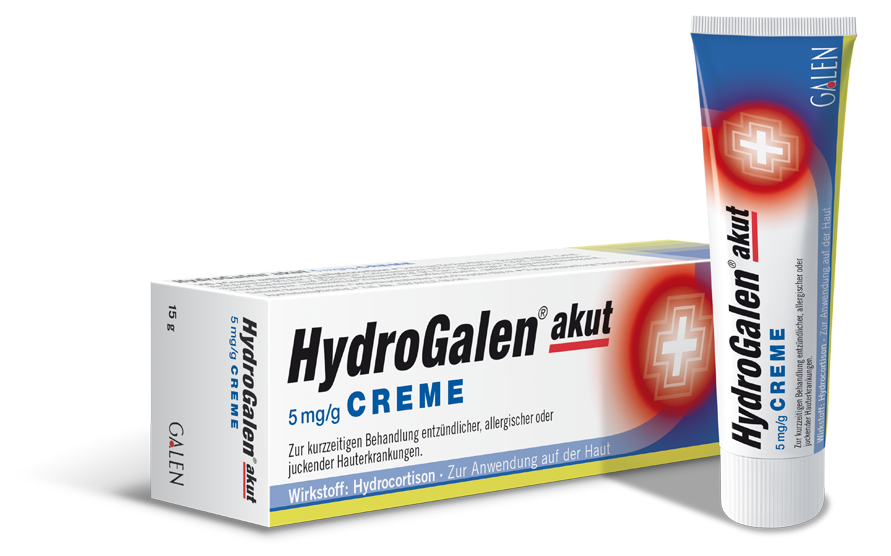Any other questions?
How do allergies arise?
An allergic reaction occurs when the body’s own defence mechanisms combat foreign substances that are actually harmless, such as pollen, animal hairs or the faeces of house dust mites. This unwanted immune reaction frequently leads to allergic complaints that may take the form of itching eyes, sneezing, shortness of breath or gastrointestinal problems.
Contact allergies are another form of allergic reaction. Examples of this are allergies to nickel (in jewellery), cosmetics and scents. The skin may react to contact allergies with redness and itching. Such complaints can be treated with an over-the-counter cortisone cream, such as. HydroGalen® akut Creme.
Allergic reactions generally do not occur immediately on initial contact with the allergens, but only after repeated contact. If you know your allergy triggers, it’s best to avoid an allergic response by avoiding those allergens. Of course, this is often not possible, as in the case of pollen or dust mites. In such cases, medicinal products can relieve the symptoms.
Pollen allergies that have been diagnosed by a doctor (e.g., to hazel, birch and grasses) can be treated with over-the-counter corticosteroid nasal sprays, such as MomeAllerg® Nasenspray.
Don’t be afraid of cortisone!
In the past few decades, corticoids have played major role in medical progress.
Pharmacists and doctors know this, but fear of cortisone is regrettably still widespread among the population.
As a result, cortisone is frequently not used despite its good efficacy.
If the product is applied appropriately, there is very little risk of the skin suffering side effects.
What’s more, hydrocortisone applied externally in HydroGalen® akut Creme affects only the local area and not the entire organism.
What should a first-aid kit contain?
To make sure you don’t end up spending precious days of your holiday in foreign doctor’s practices or pharmacies, you should be prepared to treat the most frequent health problems yourself. Find out here all of the items you should include in your travel first-aid kid and what to bear in mind.
- Antiseptic to treat cuts
- Plasters
- Thermometer
- Antipyretic and analgesic medication (for fever and pain relief)
- Decongestant nasal spray
- Pain-relieving ear drops
- Glucose/electrolyte powder
- Acute diarrhoea tablets
- Sun blocker for body and lips
- Aloe vera or a light cortisone ointment (e.g., HydroGalen® akut Creme)
- Nasal spray for hay fever (e.g., MomeAllerg® Nasenspray)
Tip: The package leaflets of medication already in use always belong in the package so that no confusion can occur regarding use or dosage. Always keep your travel first-aid kit in a cool, dark place and out of children’s reach. Expired medicinal products may no longer be used.
 DE
DE  EN
EN 